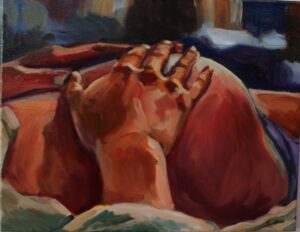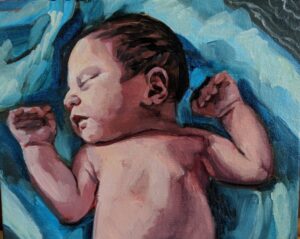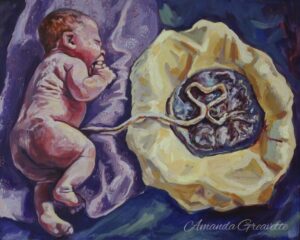This is an extract from the first book in my Yeats-Gonne series, A Life Before This One, a biographical fiction series about Maud Gonne, her daughter Iseult and the poet, WB Yeats. This extract introduces Honor Bright, a key character in the series, and the narrator Rosy Cross. (Images from “The Birth Project by Amanda Greavette).
Honor bright. When I was young, people would say those words when they wanted you to believe whatever truth or lie they were putting over to you. Honest to God. Cross my heart and hope to die, stick a needle in my eye. By all that’s holy. Upon my honor. Honor bright.
I knew a girl who took that name. First she had it given to her, then she accepted it, then she became notorious. Newspapers reports and short stories and songs were written about her tragic end. I knew her long before all that. I knew her before she had any name at all, for I saw her being born. I knew her, and I loved her from that moment of her birth, to this moment of writing about her now, for the first time.
By rights I should not have been there for her birth, that day back in 1900. I was due to go back to England that afternoon, only the donkey took a tumble on our way to the train, and we missed it, and I had to return back home until the morrow. I didn’t mind, though I knew it meant trouble when I got back. I was on my first time home since I’d left nearly ten years before, and only God knew when I’d have the money to be back again. An extra night wasn’t unwelcome, though I’d not chosen it.
When the little Neill girl came to our cottage door, saying to Nana, “Missus, you need to come! You need come now!”, and Nana said to me, “Do you want to come along?”, my answer was: of course. Of course I did. It had been years since I’d last seen Nana deliver a child or heal an animal, and it was always a sight to behold. Plus, God only knew when I’d see it again.
Mammy helped us to quickly pack Nana’s big brown bag, and saw us off, and we set out together at a brisk old pace, down the main road, the child leading the way. It was only when we were almost there, and they began to slow, that I realised what house we were going to.
“Neill’s?” I said. “Not to Kate?”
“Yes, what of it?”
“The last time I went with you, Nana, it was to her also. Don’t you remember? That time. That child.”
“Is that so? Well, that should be a good omen, so. All that all worked out fine, in the end. She’s had a few more since then.”
At the door of the house, a group of children were playing marbles, and there was the very child himself. I was able to pick him out, for though his hair was brown and ordinary, his eyebrows were thick and heavy slanted, obscuring his eyes, and he was already tall and stringy, like his father.
I looked at Nana but she just wore that face I'd seen so often before that said, don't be asking, don’t be disturbing me now. She called out to the children, “All right now, off you go and play somewhere else for a while.” They scattered, and in we went, Nana closing the door firmly behind us.
It was dark inside, with little changed, just everything a little older, a little more worn by time. A log fire, smoke twisting from the chimney. Walls whitewashed but scuffed by children's boots. Flies buzzing. A smell of old food. In the corner, on the settle bed, Kate Neill, lying out just like before. And hovering over her now as then, holding her hand and wiping her down, was her sister, Francis Morris. A new maid though, whom I recognised. Sheila Lynch, who was in my class at school.

What had changed, and drastically, was Kate herself. Kate Cullen, as I knew her before she married Mick Neill. I tried not to stare at what a difference a decade had made. Back when I left for England, just after her marriage, she was—by a country mile—the best looking girl around. Looking at her then was like standing under a flood of moonlight. Now the shell coloured lips that used to beguile everyone were a sickly grey, her once high cheeks now sagged under baggy, bloodshot eyes, and her hair looked liked rat tails that had been dipped in a bucket of grease.
It wasn’t just the labour she was in, but something more permanent that had shifted in her. Though her body was swollen with child, inside she’d collapsed. Once a moon-mirror, now her spirit had no shape or color. A decade of Graiguespiddogue had marked her face, a decade of Graiguespiddogue had marked her heart. It could be seen in her looks, but also in the state of the house, and in the rough clothing she was wearing, and the way it was pulled all about her, exposing her legs and lower half, without awareness.
I coiled inside myself, tense in the old way, feeling like I should spring back out the closed door, before I got marked myself, but Nana was already emptying the contents of the big brown bag onto the old table under the window, with hands strong as whipcords. No hesitation allowed, a baby needed to be born.
She started mixing something in a cup, and soon we could smell comforting smells, clove oil and camphor, and through the clinking of the iron pan and bucket, and offsetting Kate Neill’s cries when they rose, Nana’s prayers and spells, muttered in a low voice like leathered leather, too quiet be heard distinctly. No matter, the sound soothed us all.

After maybe an hour of this, Nana said, “It’s time now, Kate. You’re ready,” and then the rhythm changed. No more prayers, or just one, said loud and clear over the raw, animal note in Kate’s cries, each time her birth pains came in. Push. Then every muscle and tendon in her would tighten, as her hands rounded into fists, and four white bony peaks of knuckle showed. Push. The time between closed in, until the next wave was breaking in on top of the last. Push, mo leanbh. Brúigh!
Time shrank. Now everything was about this, woman and birth. Her breath, between-times, sounded rough, like the crackle of black coals, matching the twist of blue smoke that was still escaping the chimney, and the scent of charred wood filling up the cottage. Then the gasping, shuddering pain would come in again.
Nana took the child by the legs, and turned her upside down, groping with an expert finger inside the tiny mouth, clearing mucus. There was a long moment of tension, then the baby cried, a thin, piping cry, more bird than human. Relief flooded the room. Nana laid her down on the cloth waiting for her on the table, and checked her hips gently, stretching the curled up legs out to one side, then another. Then she wrapped her in a patchwork blanket stretched taut round her, and brought her across to her mother.
When at last the baby came, she seemed to come easy, to slip into the world like a snake. Kate was slumped to one side, her mouth slack, her eyes rolled back, and I was shocked at all the blood. I remembered being shocked the same way the last time. Blood crimson red and glistening everywhere, pooling in the bed, slick and sticky on Nana's hands, still coming out of Kate as her pains kept on pushing, without being asked, though the child was out in the world, squirming.
Her little face was upturned and pale, her eyes closed but nostrils flared, and her cheeks were twitching, as if she was dreaming,. Her head had a skullcap of veins and downy fair hair, wet-plastered down. Every piece and part of her was so tiny, and so far as I could tell, perfect. “A girl,” Nana said. “A lovely girl for you, Kate.”
 She saw my face, as she handed the child, now a swaddled mass, to Kate. “What's wrong with you, mother's helper?” She spoke to me like I was still seven, though I was a grown woman now, home from England, and now the others were smiling again, but with a different kind of smile.
She saw my face, as she handed the child, now a swaddled mass, to Kate. “What's wrong with you, mother's helper?” She spoke to me like I was still seven, though I was a grown woman now, home from England, and now the others were smiling again, but with a different kind of smile.
The old puzzle opened up as it hadn’t for the whole week I’d been home. Though I was standing there in my English outfit, clothes none of them would ever be able to afford, yet they were all laughing at me for something I didn’t understand. It was all wrong. I’d seen things they’d never know, but it was as if they all knew something I didn’t. As if they’d put away the body and mind I brought home with me, and put them away, and given me back my, old awkward way of being.
“Nothing’s wrong,” I said. “All’s well.”
“Have you a name?” Francis asked Kate, to take the attention back where it belonged.
“Mary Catherine.”
“Is that so?” Said Nana. “But haven’t you a Mary already?”
“Mary was named after Michael’s mother. This is after our mother, mine and Francis’s. And after me myself.” The candle light flickered throwing a shadow across her eyes, so glassy and unblinking, a skull with a grey face pressed on, stretched and pulled, squinting at her new child. “She’s not Mary, she’s Mary-Catherine.”
The baby started to cry more earnestly, small cries in waves, that I could feel beneath my feet, as if they were rising and falling and taking the whole house up and down with them. I felt as full of love for her as if I’d had her myself.
I’d once been a sticky wet newborn delivered by Nana too, was what I was realising. I’d seen her do deliveries before but this was the first time I registered that, just like this baby girl, I’d been held upside down by the ankles, panicked hands clutching, wet breath smelling of sweat and blood and sweetness, mouth pursing for mother's milk, crying, wanting, needing.
I felt a fierce bond with this baby, turning silver and snakelike inside my own skin. I wanted to hold her, rock her to sleep, feed her and bathe her. I wanted to protect her from the world's dangers. Is that part how I felt then? Or is it only how I feel now, looking back through the dark glass of all that happened after? What I do can be sure of, what brought me to her again in later life, and has me writing about her now, is how she made me feel whole again, somehow moving me along old memories of my own blooding and coming, my own head appearing into a flood of moonlight. I can feel that feeling press into me now, cover my old limbs and face. The first sight of her gave me back to myself. I belonged again. No longing.

All eyes were on the baby except Nana’s. We weren’t finished yet. She was pulling at the baby cord gently with one hand, while pressing and kneading Kate’s belly with the other, and using her eyes to tell me to pick up the bucket she’d left standing in place, so the afterbirth could trail down into it.
Eventually, out it slithered too, a grey pancake with purple blood vessels billowing across its surface like the twigs and branches of a tree, but slick and slippery as a water creature, smelling of fish and copper. Sheila took the bucket out and had the task of wrapping it in muslin brought for the purpose and setting it under the trees, away from the houses, for wild animals or roving dogs to feed on.
Now Francis was wiping her sister’s forehead and we were all filled with joy at what had been made, when Kate said, loudly, over our talk: “Never again!”
“That’s what they all say,” laughed Gran. “You’ll be right as rain in no time, Kate. Just a little feed and then a rest.”
“Never again. Let this be the last of it now.”
* * *
It was dark by the time we left. After the orange and brown colors of Neill’s cottage, the light outside felt shiny white, crisp and clean. The moon was a thin slice of silver, hanging in an open sky, a jagged shard of crystal set off by summer stars. In the fields, there were buttercups, towering bachelor's buttons, tiny sprigs of lavender, and butter-yellow ragwort, all paled by the light of night.
I didn’t know then I would never see Nana again, though I knew of course there was the chance of it. Every emigrant lives with such knowledge but it was low down in me. I was full of Kate and her little one, and the wonder of all we'd witnessed, and my admiration for Nana, wrapped in moonlight as she walked beside me, along the road I’d walked a thousand times, she a hundred thousand. The magic light was on us both, as we took in the scent of ordinary, slightly acrid things: the wildfowers, damp earth, fresh cow dung. I was tired and exultant and I hardly knew where I was, though I was walking a road more familiar to me than any other, the main road of Graiguenaspiddogue, my home place. I was just a cloud of light, No, I was a young woman falling through a cloud of light, through the air, through the ground, through the ocean, down into the depths of the world.
“Never again,” Kate had said, and I’d said to myself, maybe never for me neither, now I’ve seen what I’ve seen. Maybe the sight of that child was enough and I’ll never need to have one of my own and go through all that. Now I’m older than Nana was then and I know never is a very long time.
*****
